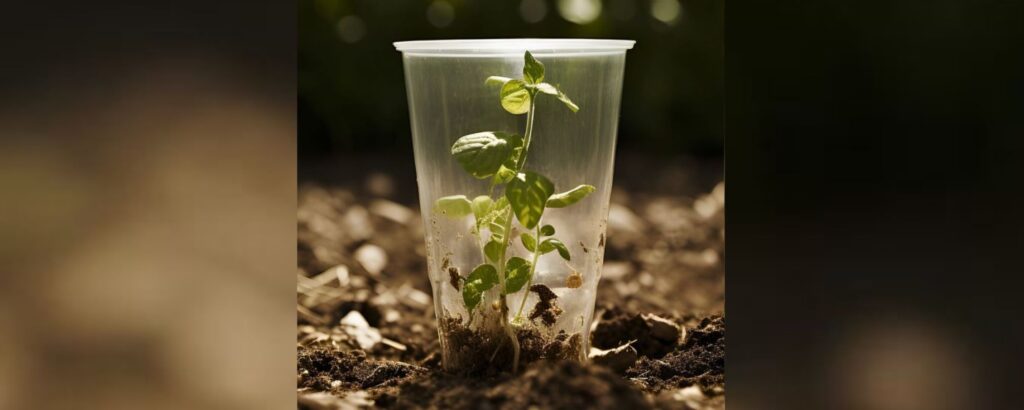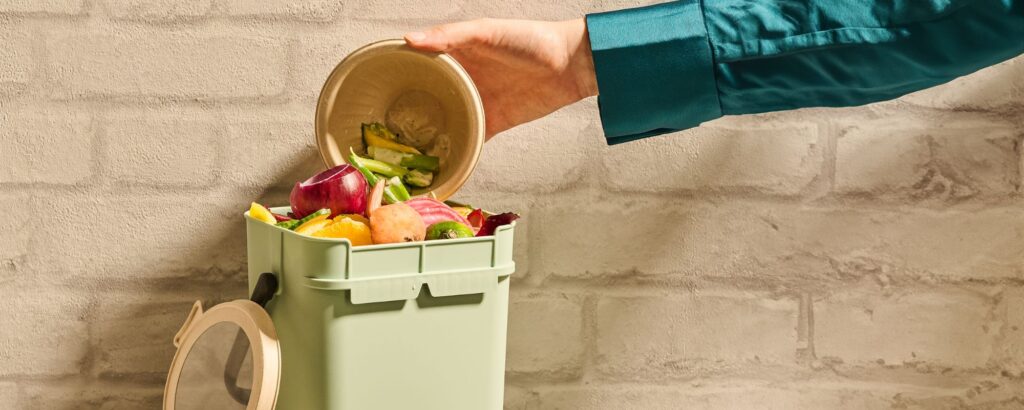In het tijdperk van duurzaamheid zijn termen als composteerbaar en biologisch afbreekbaar zijn overal, afgedrukt op verpakkingen, vermeld in productbeschrijvingen en gevraagd door klanten die hun ecologische voetafdruk willen verkleinen. Maar hoewel de twee termen vaak door elkaar worden gebruikt, betekenen ze niet hetzelfde.
Het verschil begrijpen is essentieel voor het maken van geïnformeerde en verantwoorde aankoopbeslissingenvooral in sectoren zoals foodservice, catering, detailhandel en evenementenwaar veel wegwerpproducten worden gebruikt.
In deze gids beschrijven we de belangrijkste verschillen tussen composteerbaar en biologisch afbreekbaar materialen - en helpen u de oplossing te kiezen die het beste past bij uw behoeften en uw duurzaamheidsdoelstellingen.

Wat betekent "biologisch afbreekbaar" eigenlijk?
A biologisch afbreekbaar product is iets dat breekt op natuurlijke wijze af door de werking van micro-organismen zoals bacteriën of schimmels. Echter:
- Er is geen vaste tijdslimiet voor hoe lang het duurt om af te breken
- Het kan microplastics achterlaten of residuen
- De term is niet gereguleerd consequent in de hele EU of het VK
Dit betekent dat een materiaal met het label "biologisch afbreekbaar" uiteindelijk misschien wel wordt afgebroken, maar dat het niet biologisch afbreekbaar is. doen dit misschien niet op een manier die echt milieuvriendelijk isVooral als ze niet op de juiste manier worden weggegooid.
Hoe zit het met "composteerbaar"?
Composteerbaar materialen niet alleen biologisch afbreken, maar dit ook doen in specifieke, gecontroleerde omstandighedenveranderen in niet-giftige compost die de bodem kunnen verrijken. Ze moeten:
- Volledig afbreken binnen een tijdschema instellen (meestal 90 dagen)
- Verlaat geen schadelijke residuen of toxines
- Voldoen aan EU-normenzoals EN 13432 voor industriële compostering
Op deSter x nupikVeel van onze producten, zoals composteerbaar bestek en meeneemverpakkingen, zijn gemaakt van plantaardig materialen die voldoen aan deze composteerbaarheidsnormen.

Industriële vs. thuiscompostering
Niet alle composteerbare producten zijn hetzelfde. Het is belangrijk om onderscheid te maken tussen:
Industriële compostering
- Vereist hoge hitte en vochtigheid
- Gewoonlijk uitgevoerd in gespecialiseerde faciliteiten
- Geldt voor de meeste composteerbare voedselverpakkingen en bestek
Thuis composteren
- Lagere temperatuur en langzamer proces
- Alleen bepaalde producten komen in aanmerking (gecertificeerd "OK Compost HOME")
- Ideaal voor huishoudelijk voedselafval of tuincompost
Als je levert aan klanten of detailhandelaren, etikettering is belangrijkcomposteerbaar betekent niet altijd dat het in de tuinbak kan.
Waarom het verschil van belang is bij het kiezen van een product
Voor bedrijven, vooral die in horeca, catering, voedsellevering en detailhandelDe keuze voor composteerbare producten in plaats van algemene biologisch afbreekbare producten heeft duidelijke voordelen:
- Naleving met EU-milieurichtlijnen
- Meer vertrouwen bij de consument (geen greenwashing)
- Betere partnerschappen voor afvalbeheer met lokale composteringsdiensten
- Duidelijker etikettering en begeleiding aan het einde van de levensduur voor klanten
Als je kiest voor composteerbaar, kies je voor een gecertificeerde circulaire levenscyclus.
Hoe deSter x nupik verantwoorde keuzes ondersteunt
We bieden een breed scala aan ecologisch ontworpen, composteerbare oplossingen in categorieën zoals:
- Papier en Hout Bestek
- Afhaalcontainers en drinkgerei
- Voor detailhandel geschikte verpakking met composteerbaarheidspictogrammen en verwijderingsinfo
Elk product wordt gelabeld met de route aan het einde van de levensduur, inclusief of het composteerbaar in industriële omgevingen, thuis composteerbaarof recycleerbaar.
We ontwerpen ook onze displayoplossingen om retailers te helpen eindklanten te informeren op het verkooppunt, zodat duurzaamheid een gedeelde verantwoordelijkheid wordt.

Waar moet je op letten? Mindful omgaan met groene claims
Nu duurzaamheid een belangrijke drijfveer voor aankopen wordt, zijn termen als "milieuvriendelijk", "groen plastic"of "biologisch afbreekbaar" komen steeds vaker voor. Hoewel veel leveranciers zich inzetten voor verantwoorde praktijken, is het belangrijk voor inkopers om op de hoogte te blijven van de ontwikkelingen. attent en goed geïnformeerd bij het beoordelen van productclaims.
Om zelfverzekerde, verantwoorde keuzes te maken, raden we aan:
- Controleren op officiële certificeringen
- Duidelijke begeleiding bij het levenseinde vragen om te begrijpen hoe het product moet worden weggegooid
- Streven naar transparante, op bewijs gebaseerde milieuclaims ondersteund door documentatie
Dit niveau van aandacht is vooral waardevol bij het bedienen van eco-bewuste klanten of werken in regio's met strenge milieuvoorschriftenWaar compliance en geloofwaardigheid er echt toe doen.
Kies voor duidelijkheid, kies voor verantwoordelijkheid
Kiezen tussen composteerbaar en biologisch afbreekbaar is niet alleen een technisch onderscheid, het is een strategische beslissing die je waarden, merk en impact op het milieu weerspiegelt.
Op deSter x nupikWij zijn er om je te helpen bij deze keuze met gecertificeerde, betrouwbare en hoogwaardige oplossingen die aansluiten bij de Europese duurzaamheidsdoelen.

